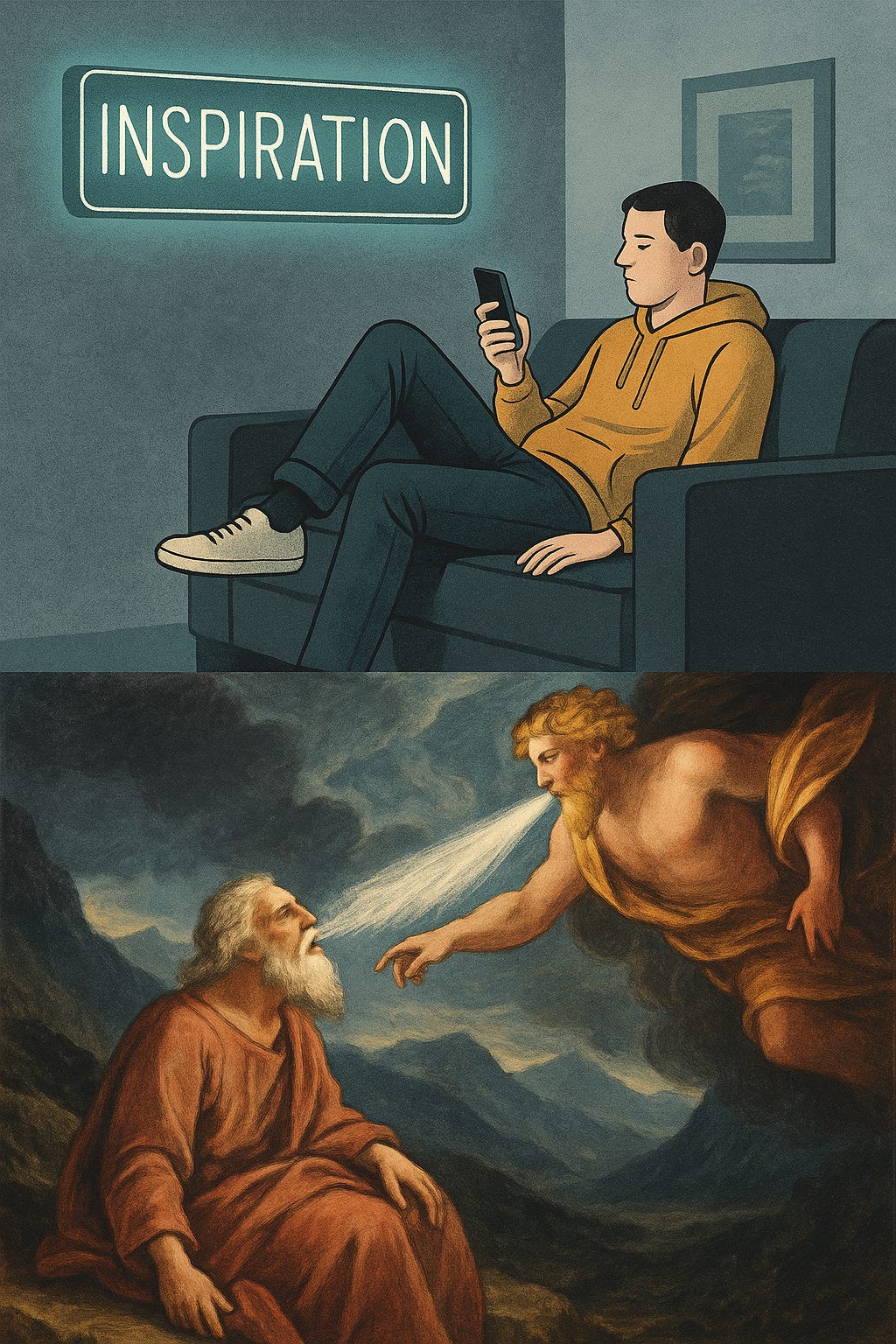Where do you normally get your inspiration?
In 2025, people who live near the top of Maslow’s pyramid spend a lot of time looking for the final pieces on the road to fulfilment. Self-actualization through personal growth now fuels an entire industry, and it’s almost like a commodity you can just go out and buy.
This has not always been the case.
The word “inspire” comes to us from the Latin inspirare, where the prefix in- really did mean into, and spirare meant to breathe. Divine beings would breathe into mere mortals, giving them creative ideas that seemed to come from somewhere other than a human mind.
We’ve kept this old Roman word alive for thousands of years, intact with a similar—albeit more metaphorical—meaning today. Yet, the Romans were far from the first to come up with the idea of the gods breathing something magical into humans. Egyptians, Hebrews, and Greeks all had the same sorts of ideas, and it doesn’t seem to have been confined to the Mediterranean world. We humans have been imagining that gods have been breathing into us for a long, long time.
Today, if you want inspiration, you might spend some time watching a documentary or going for a walk in the woods, or try a new spot for brunch. What might you have been willing to do to have the gods breathe into you if you lived in the ancient world?
Instead of turning on Hulu, an ancient Egyptian, Greek, or Mesoamerican might go on a pilgrimage to visit a mountaintop in a dangerous terrain, surrounded by wilderness and far away from the protections of their village or city. If there was a desert close by, maybe you could go out there for long enough to nearly die from sun poisoning and dehydration—all in the quest of a crappy hallucination.
Alternatively, you could visit the Oracle at Delphi and breathe in whatever brain-damaging substance came up from the ground, or you might join one of those mystery cults in Greece, like the one Pythagoras founded—in order to find divine inspiration, they would live austere lives, giving up all creature comforts for good.
The point was that there was a tremendous cost to anyone who wanted to be inspired. The trade-off for being able to have insight probably didn’t seem worth it to most people, so those who sought after inspiration always seemed a little eclectic.
In many ways, folks who are actually after inspiration today are like this. Even though it’s much easier to get new information and ideas today, we often take this for granted and simply accept whatever is right in front of us. We binge-watch whatever show pops up on our suggestion feed (really, don’t ever do this), and we look to pawn off every other little decision we make.
Every day, I try to chase the feeling of wonder. That’s the one predictable source for inspiration in my own life: if I see or hear something that really blows me away, I’m definitely going to want to share it with you. To that end, you can see these posts under the tag wonder, should you become inspired to take a look.





Thanks for the mental image of Gods breathing stuff into me. I'm not sure I'll be recovering from that.
But also, it's comforting to know that my Netflix binges are the modern equivalent of mountaintop pilgrimages. I feel so accomplished now.
Nowadays, I quite often turn to quick Internet searches or ChatGPT for minor stuff that pops up, e.g. whenever my kids ask something curious. I mostly take it for granted, and, since there's almost no friction, it doesn't feel like learning or drawing inspiration. But it's crazy to think how different that mode of exploration is from what I grew up with.
Animation has been my major inspiration as a fiction writer, and it is also something I have chronicled in my non-fiction writing. There have been other things as well, but that still looms large in developing my current artistic mindset.